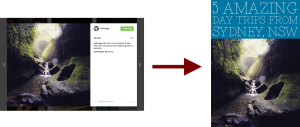From carousel ads to dynamic ads to video ads and more, columnist Brad O’Brien offers tips on how you can increase performance for Facebook ads of any variety.
 Advertisers flock to Facebook and Instagram because of the unparalleled targeting, engaged audiences and bevy of visual ad products. Clients frequently ask me what the “best” type of ad is on Facebook. The truth is, they are all capable of driving incredible ROI when you know how to best utilize them.
Advertisers flock to Facebook and Instagram because of the unparalleled targeting, engaged audiences and bevy of visual ad products. Clients frequently ask me what the “best” type of ad is on Facebook. The truth is, they are all capable of driving incredible ROI when you know how to best utilize them.
The tips in this post include best practices, plus my own personal recommendations to maximize performance for each Facebook ad type.

Tips for all ads
Stand out. Remember that Facebook has a cool color scheme (blues, grays), so use bright colors like oranges, reds and yellows. With the majority of Facebook traffic being mobile, you’ll want to create “thumb-stopping” visuals.
80/20 rule. I like to apply the 80/20 rule to text, assuming that the image/video will generally drive about 80 percent of performance and the copy around 20 percent. To maximize the impact of A/B testing, prioritize the visual over the copy.
Keep it concise. For copy, shorter is almost always better; within 90 characters is recommended. My personal upper threshold would be 120 characters.
Single-image tips
Text overlays and logos are routine top performers in my experience. I’d also recommend placing a CTA (call to action) “button” on the image to increase perceived clickable space and better qualify clicks. While keeping within 20 percent text/logo on images is no longer required, Facebook may still limit delivery when you go over this percentage.
Ensure you test several macro iterations: lifestyle, product/dashboard shots, illustrated and more. When you determine which performs best, move on to a series of micro-iterations.
Carousel tips
Carousel ads are perfect for telling a visual “story” and can captivate a user’s attention by doing so. They’re also perfect for highlighting product variety.
No products? No problem. Use the carousel ad unit to explain your services, value props and brand differentiators.
If the order of the images and videos is not important to you, try uploading up to 10 and letting Facebook’s algorithm sort based on engagement with each card.

Dynamic ad tips
An obvious fit for retail and e-commerce, dynamic ads have become a retargeting powerhouse for many advertisers. Broad audiences are also rolling out to all advertisers, which essentially turns this into a prospecting ad type.
Aside from retail and e-com, I encourage brands in travel, auto, real estate and food delivery to use dynamic ads — as they can all create product feeds.
In my experience, the carousel ad template generally performs best for dynamic ads. Ensure you are taking advantage of upsell and cross-sell capabilities to increase margins and AOVs (average order values).
Also, take a segmented approach in ad set audiences based on recency, depth, and duration of visit while managing bids and budgets autonomously.
Video ad tips
A question I receive frequently from clients is, “Have you seen video outperform images?” The answer is yes, and while some verticals are better suited for video, it is a formidable tool for any brand.
The best tip I have is to keep video short — under 30 seconds, ideally. You should also optimize the thumbnail of your video ads and choose it with the same diligence you would a single-image ad.
While Facebook recently announced that videos will auto-play with sound, I’d still recommend the use of text overlays in videos (think TV commercials and their use of sound and text).
Build audiences based off engagement with your video ads. Choose quality-defining metrics like users who have viewed 75 percent or more of your videos and use them for sequential messaging or lookalike audiences for prospecting.
Canvas ad tips
Canvas ads allow you to take the user through a visually immersive experience contained within Facebook and Instagram. While I would not consider this the most direct response ad product on Facebook, it has its use cases.
The sky is the limit when it comes to the types of visual elements you can mix and match with Canvas. To drive action, ensure you are sprinkling multiple CTAs throughout the ad unit. Give the user multiple opportunities to continue through to your site and take action.

As with video, you can create audiences based off engagement metrics with this ad product.
Slideshow ad tips
Slideshow ads were originally intended to be used when advertising in areas with poor internet connectivity and to users with older mobile operating systems. While this is not a common ad format, it could be worthwhile to test for your brand under the right conditions.
For creative, try testing your top-performing carousel ads as a start since slideshows are a looping video of up to 10 images. You can also treat these as lightweight “storyboarding” ads to gauge user engagement before you make a heavier investment in video or canvas ads.
Now that you’re armed with some fresh perspective, get out there and test some ad products!
Some opinions expressed in this article may be those of a guest author and not necessarily Marketing Land. Staff authors are listed here.
Marketing Land – Internet Marketing News, Strategies & Tips
(77)









